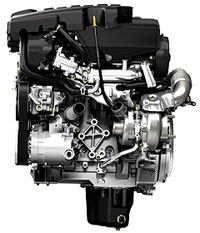Make / Model Search
News - FordFleets to reward dieselsDistilled: Ford will produce a diesel Falcon in 2010. Fleet chief says first local diesel car will be richly rewarded but jury remains out22 Apr 2008 FORD Australia could score a market coup with fleet operators if it successfully becomes the first local manufacturer to produce a large turbo-diesel passenger car. In fact, diesels could be the key to rescuing Australia’s traditional ‘big six’ car market, which is already shrinking and could become unsustainable within a decade if it remains dependent on petrol engines. As GoAuto reported earlier this month, Ford will produce V6 diesel-engined Falcon and Territory models from 2010, while large-car rival Holden is understood to be still working on a business case for a turbo-diesel Commodore. According to a leading fleet management company, the environment is now a major purchasing consideration and the first Australian car-maker to offer a large diesel car will be rewarded with the big prize of more fleet orders. “Yeah, I think so,” said Keith Cormican, the managing director of Custom Fleet, which has 110,000 vehicles in Australia and 30,000 in New Zealand. “I think there is a genuine acceptance by the fleet operators that a good locally produced diesel motor car will go very strong in the market. “People are just forming conclusions that, ‘Why wouldn’t you put a diesel motor in the average fleet car in Australia and get potentially another third or something in (fuel mileage)?’ There must be a wider opportunity for a fleet market if they can produce diesel fleet cars.” Mr Cormican said that fleets would not be deterred by a likely higher purchase price for a turbo-diesel Falcon or Commodore because overall running costs would be lower and resale prices would be higher – more than is the case with LPG. “LPG is quite strong at the moment, but there is still a widening acceptance of diesel in the market,” he told GoAuto. “It’s much more accepted in the market. You’ve got a lot of fleets that have been running light commercials that have been all-diesel for many years.  “A typical fleet might be running 100 light commercials on diesel and 50 tool-of-trade passenger cars, so it’s easy for those fleets to convert to total diesel. “With diesel, it is also a good mix in terms of solving running costs, whole-of-life cost and even the environment because the CO2 emissions are pretty good with diesels. It’s not a bad option at the moment.” However, the Australasian Fleet Managers Association has issued a word of warning, noting that many authorities globally still regard diesel as a cause of cancer. AFMA research and communications director Ken Thompson told GoAuto this week that the EPA in the US “really gave diesel a bashing” over health issues in a recent 660-page report. “From an operational point of view, there can be a benefit in going diesel, but it gets more interesting when you start looking at the environmental impact,” Mr Thompson said. “While it is true that diesels in general put out less CO2 than equivalent petrol engines, they put out other things that are quite nasty – like nitrous oxides and particle matter – to the point now where it is recognised in a number of countries as being a carcinogenic. “Diesels give you better energy efficiency from the fuel and a bit less CO2, but it does have these other emissions that are not very good for you. There is still a lot of concern about diesel. “If you are looking at the environment, then reducing CO2 is the better way to go (but), if you are talking about people and health, then diesel really is not the best fuel to use.” Mr Thompson said there are some encouraging developments with diesel technology, including chemical injection systems that inject urea into the exhaust (a system already being used by Mercedes-Benz) and a 10 per cent LPG injection system that reportedly increases power while reducing fuel usage and emissions by 10-15 per cent. He said “the jury is still out” on how efficient diesel particulate filters are and how effective they will be after five to ten years’ use, and over the health hazards posed by the particles that escape into the atmosphere. Mr Thompson said that producing cleaner diesel fuel in Australia would be a good first step to safer diesel usage, but this may not happen because of the capital cost required by the local refineries to produce world-standard diesel. Despite these question marks, there is no question that companies and their executives are becoming increasingly green. Although large-car sales are down, Custom Fleet says this is mainly because of private buyers and ‘user-chooser’ novated leases rather than commercial fleets, which are staying largely faithful to large six-cylinder cars. But Mr Cormican recognises the trend and notes the growing awareness of green issues. “We’re being challenged now by customers in terms of the environment and sustainability,” he told us. “Their number one issue is whole-of-life costs, but they have an awareness now around environmental issues and a duty of care. “There’s been some change in the take-up of alternative fuels – diesel predominately – but there are still cost issues in terms of initial investment with hybrids. “I don’t see us driving large six-cylinder petrol cars in five to ten years’ time, not in the volumes we are now. There will be a change and that’s going to be driven by pressures around the environment. “People want to be a bit kinder to the world, as long as it doesn’t cost any more... that’s the challenge.” Read more:Ford: Duratec won’t disappointDuratec won’t match straight six for grunt |
Click to shareFord articlesResearch Ford Motor industry news |









Facebook Twitter Instagram